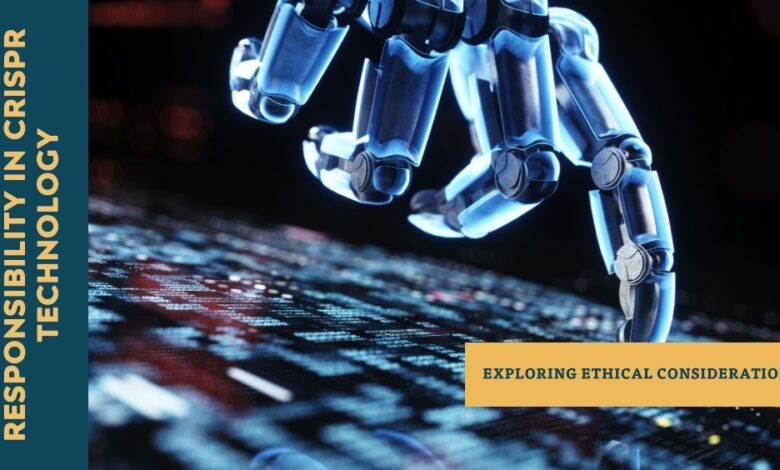Ethical Considerations in CRISPR Technology: Balancing Promise and Responsibility

The advent of CRISPR technology has opened up unprecedented possibilities in the realm of genetics and genomics. This revolutionary gene-editing tool, CRISPR (Clustered Regularly Interspaced Short Palindromic Repeats), can potentially treat genetic diseases, modify organisms, and advance biotechnology. While CRISPR holds enormous promise, it also raises profound ethical questions requiring careful consideration. In this article, we explore the moral dimensions of CRISPR technology, examining the balance between innovation and responsibility.
Defining CRISPR Technology:
CRISPR technology, represented by the CRISPR-Cas9 system, is a gene-editing tool that precisely modifies an organism’s DNA. It has gained attention for its potential to treat genetic disorders, alter the genes of crops and livestock, and enable innovative biotechnological applications.
The Ethical Dimensions:
- Human Germline Editing: One of the most contentious ethical issues involves editing the human germline, which can result in heritable changes that affect future generations. While CRISPR could theoretically eliminate genetic diseases, it also raises concerns about unintended consequences and “designer babies.”
- Inequality and Access: The accessibility of CRISPR-based treatments and interventions raises questions of equity. Will CRISPR-based therapies be available to all, or will they create disparities in healthcare based on financial means?
- Environmental Impact: Using CRISPR in agriculture may lead to genetically modified organisms (GMOs). Ethical considerations encompass the potential ecological impact, including unintended consequences on ecosystems.
- Dual-Use Dilemma: CRISPR technology can be used for beneficial and potentially harmful purposes. The dual-use dilemma poses the question of ensuring responsible and ethical use while preventing misuse.
- Consent and Autonomy: In the context of clinical trials and gene editing, issues of informed consent and individual autonomy are paramount. Ensuring that individuals fully understand the risks and benefits of CRISPR interventions is essential.
Regulatory Framework:
In response to CRISPR technology’s ethical challenges, regulatory bodies and international agreements have been established to set guidelines and standards. These regulatory frameworks aim to balance the pursuit of scientific advancement with the need for ethical responsibility.
Public Engagement:
Involving the public in discussions about CRISPR technology is crucial. Engaging various stakeholders, including scientists, ethicists, policymakers, and the broader community, help ensure the technology’s development aligns with societal values.
Potential for Fighting Diseases:
CRISPR technology has big potential to wipe out certain genetic diseases. Scientists can precisely edit the genes causing these illnesses, stopping them from passing to future generations. This could really boost public health and make people live longer by getting rid of the genetic basis for many inherited disorders.
Bioethics and Morality:
Editing genes brings up deep questions about what’s right and wrong. It makes us think about how much humans should mess with nature and what happens when we start playing with genes. Issues like getting permission, making sure everyone can use gene editing fairly, and avoiding unexpected problems are at the heart of the ethical debate. Finding a balance between the good parts of wiping out diseases and the ethical worries of gene editing is super important.
Changing Society:
If CRISPR becomes widely available, it could change our world in a bunch of ways. We might start thinking about diseases differently and put more effort into stopping them with genetic changes. In farming, we could grow crops that resist bugs and tough weather because of genetic tweaks. Also, there’s a big question about making people “better” through genetic changes and what kind of changes are okay for society.
Future Possibilities:
- Personalized Medicine: CRISPR could totally change medicine by making treatments just for one person’s genes. This could make therapies for diseases like cancer and genetic disorders way better.
- Better Crops: CRISPR might help us grow more food by making crops that resist bugs, have more nutrients, and can handle tough conditions. This could help feed more people and be good for the planet.
- Wildlife Control: In dealing with animals and pests, CRISPR could help modify or get rid of disease carriers and invasive species. This might help with nature and public health problems.
- Therapies for Adults: Beyond stopping diseases in families, CRISPR could be used to treat genetic disorders in grown-ups, fight viruses, and maybe even slow down aging.
- Rules and Guidelines: In the future, there will probably be clear rules about using CRISPR. This is to make sure it’s used responsibly and fairly.
- Understanding Diseases: CRISPR can help scientists study diseases better by making more accurate models. This speeds up finding treatments for complex illnesses.
- Editing Human Genes: This is a tricky area, but CRISPR could lead to talks and decisions about changing genes in humans before they’re born. This brings up big questions about what stays with future generations.
In the future, as we deal with CRISPR, finding the right mix of new ideas, thinking about what’s right, and using it carefully will be super important for the good stuff to outweigh the challenges.
Read Also:
- How Morse Code is Still Used in Modern Technology
- The Intersection of Technology and Education: How Technology is Changing the Way We Learn.
- The Future of Electric Cars: How Technology is Revolutionizing the Automotive Industry
- How to use blockchain technology for secure and transparent transactions
- Computer And Information Technology
Conclusion:
CRISPR technology represents a momentous scientific breakthrough with far-reaching potential for good. However, its capabilities come with a profound ethical responsibility. As scientists and policymakers grapple with the moral considerations of CRISPR, it is essential to strike a balance between innovation and responsibility. The ethical challenges posed by CRISPR technology, from human germline editing to equitable access, require thoughtful consideration and public engagement. While the promise of CRISPR is immense, the path forward must be guided by ethical principles and a commitment to ensuring that the technology is used responsibly and for the more significant benefit of humanity.






